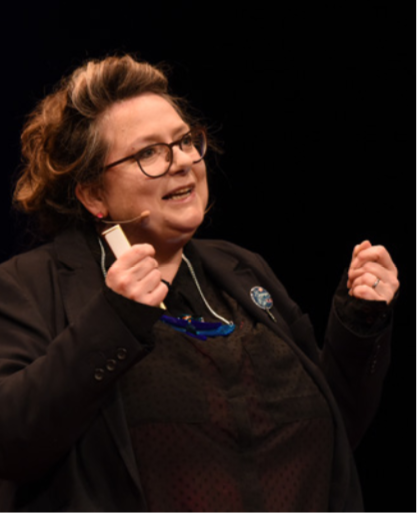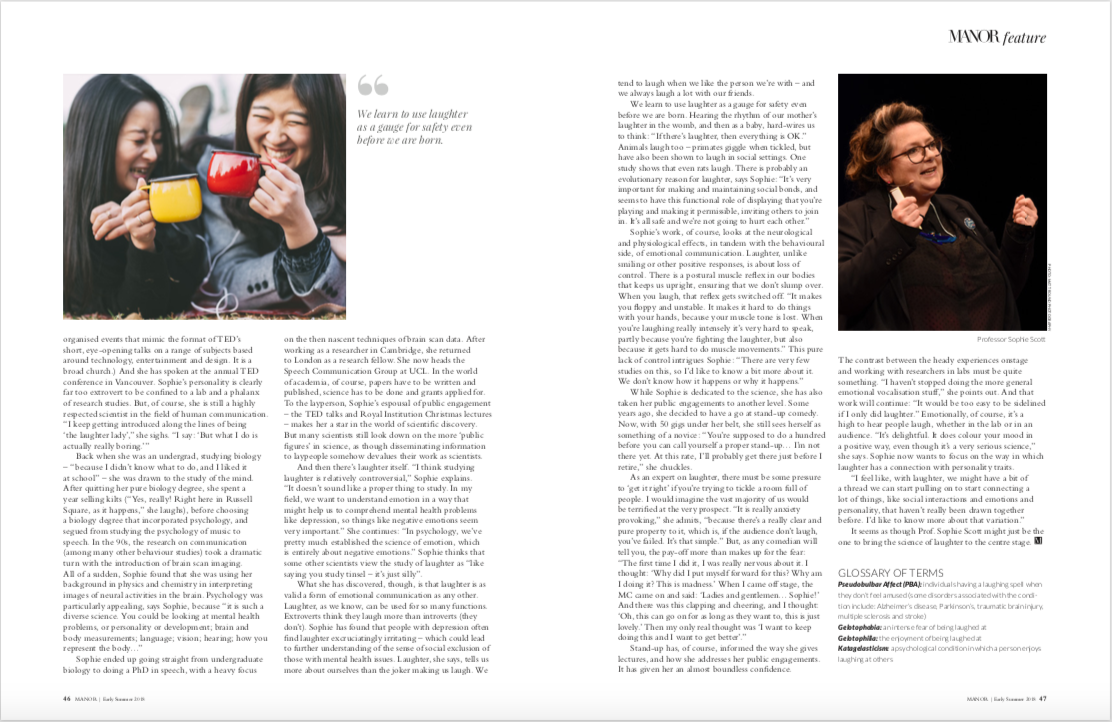The Language of Laughter

It is an unseasonably stunning spring day in Exeter. The sky is a cobalt blue. Students on the university campus are doing what students have been doing since time immemorial – sitting around, chatting, throwing balls to each other. There is a buzz around the theatre buildings – crowds of people are perching on the amphitheatre steps. Inside the auditorium, the audience is squinting in the darkness. And it’s worth hiding away from the sunshine: this is TEDxExeter and the talks are inspiring, if not transformative. Late in the afternoon, neuroscientist Sophie Scott strides onto the stage. Her presence is wide, electric, her voice powerful, no-nonsense, and it carries the confidence of a professional speaker. She is here to talk about laughter. Within a matter of minutes (or was it seconds?), the audience laughs. Less than halfway through, we are roaring. Sophie Scott is clearly not your average research scientist.
Some weeks later, I am deep in a warren of basement rooms in London’s Russell Square, home to UCL’s neuroscience faculty. Sophie sits across a bland boardroom table, yawning unselfconsciously. The harsh fluorescent lights don’t detract from her youthful face – she looks a good 15 years younger than her Wikipedia- stated age. Perhaps it’s all the smiling and laughing she does... She has five TEDx conferences under her belt. (For the uninitiated, TEDx talks are independently organised events that mimic the format of TED’s short, eye-opening talks on a range of subjects based around technology, entertainment and design. It is a broad church.) And she has spoken at the annual TED conference in Vancouver. Sophie’s personality is clearly far too extrovert to be confined to a lab and a phalanx of research studies. But, of course, she is still a highly respected scientist in the field of human communication. “I keep getting introduced along the lines of being ‘the laughter lady’,” she sighs. “I say: ‘But what I do is actually really boring.’”

Back when she was an undergrad, studying biology – “because I didn’t know what to do, and I liked it at school” – she was drawn to the study of the mind. After quitting her pure biology degree, she spent a year selling kilts (“Yes, really! Right here in Russell Square, as it happens,” she laughs), before choosing a biology degree that incorporated psychology, and segued from studying the psychology of music to speech. In the 90s, the research on communication (among many other behaviour studies) took a dramatic turn with the introduction of brain scan imaging.
All of a sudden, Sophie found that she was using her background in physics and chemistry in interpreting images of neural activities in the brain. Psychology was particularly appealing, says Sophie, because “it is such a diverse science. You could be looking at mental health problems, or personality or development; brain and body measurements; language; vision; hearing; how you represent the body...”
Sophie ended up going straight from undergraduate biology to doing a PhD in speech, with a heavy focus on the then nascent techniques of brain scan data. After working as a researcher in Cambridge, she returned to London as a research fellow. She now heads the Speech Communication Group at UCL. In the world
of academia, of course, papers have to be written and published, science has to be done and grants applied for. To the layperson, Sophie’s espousal of public engagement – the TED talks and Royal Institution Christmas lectures – makes her a star in the world of scientific discovery. But many scientists still look down on the more ‘public figures’ in science, as though disseminating information to laypeople somehow devalues their work as scientists.
And then there’s laughter itself. “I think studying laughter is relatively controversial,” Sophie explains. “It doesn’t sound like a proper thing to study. In my field, we want to understand emotion in a way that might help us to comprehend mental health problems like depression, so things like negative emotions seem very important.” She continues: “In psychology, we’ve pretty much established the science of emotion, which is entirely about negative emotions.” Sophie thinks that some other scientists view the study of laughter as “like saying you study tinsel – it’s just silly”.
What she has discovered, though, is that laughter is as valid a form of emotional communication as any other. Laughter, as we know, can be used for so many functions. Extroverts think they laugh more than introverts (they don’t). Sophie has found that people with depression often find laughter excruciatingly irritating – which could lead to further understanding of the sense of social exclusion of those with mental health issues. Laughter, she says, tells us more about ourselves than the joker making us laugh. We tend to laugh when we like the person we’re with – and we always laugh a lot with our friends.

We learn to use laughter as a gauge for safety even before we are born. Hearing the rhythm of our mother’s laughter in the womb, and then as a baby, hard-wires us to think: “If there’s laughter, then everything is OK.” Animals laugh too – primates giggle when tickled, but have also been shown to laugh in social settings. One study shows that even rats laugh. There is probably an evolutionary reason for laughter, says Sophie: “It’s very important for making and maintaining social bonds, and seems to have this functional role of displaying that you’re playing and making it permissible, inviting others to join in. It’s all safe and we’re not going to hurt each other.”
Sophie’s work, of course, looks at the neurological and physiological effects, in tandem with the behavioural side, of emotional communication. Laughter, unlike smiling or other positive responses, is about loss of control. There is a postural muscle reflex in our bodies that keeps us upright, ensuring that we don’t slump over. When you laugh, that reflex gets switched off. “It makes you floppy and unstable. It makes it hard to do things with your hands, because your muscle tone is lost. When you’re laughing really intensely it’s very hard to speak, partly because you’re fighting the laughter, but also because it gets hard to do muscle movements.” This pure lack of control intrigues Sophie: “There are very few studies on this, so I’d like to know a bit more about it. We don’t know how it happens or why it happens.”
While Sophie is dedicated to the science, she has also taken her public engagements to another level. Some years ago, she decided to have a go at stand-up comedy. Now, with 50 gigs under her belt, she still sees herself as something of a novice: “You’re supposed to do a hundred before you can call yourself a proper stand-up... I’m not there yet. At this rate, I’ll probably get there just before I retire,” she chuckles.
As an expert on laughter, there must be some pressure to ‘get it right’ if you’re trying to tickle a room full of people. I would imagine the vast majority of us would be terrified at the very prospect. “It is really anxiety provoking,” she admits, “because there’s a really clear and pure property to it, which is, if the audience don’t laugh, you’ve failed. It’s that simple.” But, as any comedian will tell you, the pay-off more than makes up for the fear: “The first time I did it, I was really nervous about it. I thought: ‘Why did I put myself forward for this? Why am I doing it? This is madness.’ When I came off stage, the MC came on and said: ‘Ladies and gentlemen... Sophie!’ And there was this clapping and cheering, and I thought: ‘Oh, this can go on for as long as they want to, this is just lovely.’ Then my only real thought was ‘I want to keep doing this and I want to get better’.”
Stand-up has, of course, informed the way she gives lectures, and how she addresses her public engagements. It has given her an almost boundless confidence.
The contrast between the heady experiences onstage and working with researchers in labs must be quite something. “I haven’t stopped doing the more general emotional vocalisation stuff,” she points out. And that work will continue: “It would be too easy to be sidelined if I only did laughter.” Emotionally, of course, it’s a high to hear people laugh, whether in the lab or in an audience. “It’s delightful. It does colour your mood in a positive way, even though it’s a very serious science,” she says. Sophie now wants to focus on the way in which laughter has a connection with personality traits.
“I feel like, with laughter, we might have a bit of a thread we can start pulling on to start connecting a lot of things, like social interactions and emotions and personality, that haven’t really been drawn together before. I’d like to know more about that variation.”
It seems as though Prof. Sophie Scott might just be the one to bring the science of laughter to the centre stage.
